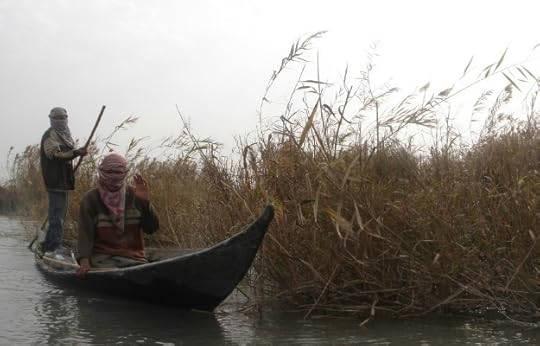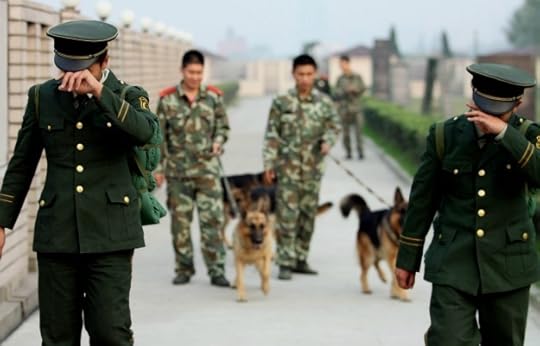Thomas E. Ricks's Blog, page 207
January 18, 2012
Best comment I have heard lately on attacking Iran's nuclear facilities

Planning on attacking Iran? "Better pack a lunch," advises
my friend, retired Lt. Col. Terry Daly, who knows a lot about war. His point was
that airstrikes alone against Iranian nuclear facilities wouldn't do much. If
you are going to attack Iran, you need to hit its ability to retaliate, and that
means that pretty soon you have a
big fat war on your hands.
I can't believe we
are discussing this. I am hearing lots
of depressing talk that there is a
good chance that Israel will attack
Iran sometime this year and that we will get sucked into the ensuing mess.
In some ways, there already is a kind of shadow
war under way with Iran -- Stuxnet, the drone intrusions, the recent
explosions and assassinations, the sanctions.
But for all that, I
just can't see Obama getting us involved in another Middle Eastern war. The American people certainly have no appetite
for it. I think he almost certainly
would lose reelection if a war broke out, because his base would fall apart
and the left would go into opposition.
At any rate, an article
by my CNAS colleague Colin Kahl that
went up last night on the website of Foreign
Affairs argues well that the "containment vs. attack" mindset is a false
dilemma. In fact, he says, even if you attacked Iran, you'd still have to
contain it afterward. So a series of airstrikes is not a substitute for
containment, but a prelude to it.
An intelligence vet knocks down one of Prof. Ajami's myths about the Libyan war

In Sunday's Washington
Post, Fouad Ajami stated
that, "Even when the rescue mission for the Libyans came, it was late, and the
push was from Paris and London, not Washington."
Au contraire,
responds an intelligence veteran I know. The French and British effectively "brought knives to a gunfight,"
he said, and had to be bailed out by the U.S. government. "The real ammunition came from
the U.S."
I'm gonna miss Rick Perry, the Foghorn Leghorn of presidential candidates

My wife's favorite Republican candidate for amusement is Newt, but myself, I enjoy watching old Rick Perry. The man strikes me as a fool in a suit, almost a cartoon version of a Texas governor. Here is his comment the other night on the government of Turkey: "When you have a country [Turkey] that is being ruled by what many would perceive to be Islamic terrorists, when you start seeing that type of activity against their own citizens, then yes, not only is it time for us to have a conversation about whether or not they belong to be in NATO, but it's time for the United States, when we look at their foreign aid, to go to zero with it. [Cheers, applause]" (To fully appreciate this, read it aloud in a Foghorn Leghorn voice.)
As the estimable Glenn Kessler of the Washington Post put it, Perry's characterization of Turkey is an off-the-charts jaw dropper. In fact, observes Kessler, a veteran diplomatic correspondent, "The ruling party of Turkey is moderately Islamic, but it generally has not interfered with the country's secular traditions. . . . As for foreign aid, Turkey is a wealthy country that already gets virtually no foreign aid from the United States."
In addition, notes Juan Cole, "Turkey has peace-keeping troops serving alongside US ones in Afghanistan, and in danger of being killed by Taliban, and it is a profound insult to reward their friendship with the US by this kind of trash talk."
January 17, 2012
Time to get serious about sanctions on Iran, especially through Lebanese banks

By David Asher
Best Defense department of non-kinetic actions
U.S. Treasury Department sanctions
against Iran are having a remarkable impact and much more is soon to come. In
recent weeks the Iranian currency has crashed and the Iranian balance of
payments, a close proxy measure for its oil revenue seems heading toward a
deficit. Moreover, recently enacted legislation -- requiring banks to cease
dealing with the Iranian Central Bank for oil imports within 60 days --
will soon be implemented. For Tehran, oil is money. Thus, cutting off oil
revenue could soon bring the Iranian economy to its knees. Iran's threats
to block the flow of oil via the Strait of Hormuz -- with the goal of sending
oil prices skyrocketing -- is a sign that the Iranians are feeling pain. For
Tehran it can only get worse.
The problem with sanctions is that the
longer they drag on, the more affected countries develop the means to skirt
them. Saddam's Iraq came under the weight of a vast sanctions regime for over a
decade and the government did not fall from power, let alone change
course. Iran is a nation of sophisticated traders and we can expect it to undertake
a web of evasive measures to struggle on. Moreover, even if the Iranian
economy is brought to a halt, history shows that those in power will be the
last to suffer. In fact, Iran's hardline Revolutionary Guards appear to be
gaining power as the nation moves onto a quasi-wartime footing.
To enforce sanctions and significantly
enhance pressure directed against Iran's leadership (not just its people), the
U.S. should consider an Iran-Hezbollah Illicit Activities Initiative similar to
the one used against Kim Jong Il's regime, 2001-2006, and akin as well to the
strategy applied successfully against Slobodan Milosevic and his
cronies in the Balkans in the mid-90s (see the testimony). These previous interagency
and international initiatives brought together
U.S. and foreign government partners to apply a matrix of pressure strategies
to directly effect the hold on power of the North Korean and Serbian regime
leaders and coerce them to either give up global defiance or potentially fall
from power. Notably, both initiatives incorporated domestic and international
law enforcement against the illicit support networks and financial sanctuaries
for regime leaders, in addition to the targeted and broader trade
sanctions being applied currently against Iran.
Pretty much every seriously sanctioned regime in history has
gotten into illicit activity to offset the cost imposed by sanctions. Iran is
no exception to the rule. It appears to have been quietly engaged in
state directed illicit activities to benefit the Revolutionary Guard and their
antecedents since the onset of the revolution (and accompanying sanctions) --
everything from illegal technology procurement and weapons smuggling to involvement
in narcotics trafficking and money laundering. In the coming months, as
sanctions bite harder and oil profits disappear, we can expect the scale and
importance of these illicit activities for the IRGC (and Hezbollah) to increase
dramatically. However, the more Tehran and its affiliates rely on illicit
activity, the easier it will be to apply law enforcement and international law
strategically to hold their leaders and their finances accountable. Provided a
sufficient enforcement dragnet is created, Iran may fall into the same self-created
trap as North Korea and Serbia. However, if an enforcement system is not
rapidly assembled, we can safely assume that Iran -- particularly with the help
of China and Russia -- will embrace the black economy as well as marshal
sanctions workarounds that could enhance the power of the IRGC, speed up its
nuclear timeline, and heighten the chances of conflict.[[BREAK]]
The groundwork
for an illicit activities initiative already exist, thanks to the excellent
work of U.S. law enforcement. In the last year, the findings of Operation Titan
-- a massive Drug Enforcement Administration money laundering
investigation into Iran's key affiliated terrorist organization, Lebanese
Hezbollah -- have emerged in the public eye. As the New York Time details in a recent
article, this investigation has documented billions of dollars of cocaine laced
funds that have made their way from Hezbollah
accounts in Lebanon into the US and European banking system over the last
five years. A December 2011 asset forfeiture claim against Hezbollah
financial fronts, including the Lebanese Canadian Bank, filed in
the Southern District of New York (SDNY) spells out the case that for Hezbollah,
Lebanon has become a veritable money laundering machine.
Ironically, the data below, from the Lebanese Central bank website,
plainly illustrates the scale of Hezbollah's money laundering activity. It is
hiding in plain sight. As the data show, miraculously, Lebanese banks
exploded in growth in the wake of Hezbollah's war with Israel in 2006 - with
dollar-denominated deposits making up nearly 2/3 of the Lebanese banking system
and over 50% of its growth. Until recently -- when DEA and Treasury began
to crack down -- bank dollar and euro deposit growth has kept up a dramatic pace, despite Lebanon having large sovereign
currency, economic, political, and security risk. This explosive growth makes no sense, unless Lebanon has become a major
financial safe haven for drug trafficking organizations worldwide (and where
the risk of moving so much foreign bulk cash and wire transfers is effectively
offset by a highly complicit Lebanese government). As the risk of
further U.S. actions has become clearer to bank depositors (bad guys included)
and the Syria/Iran crisis expands, capital has started to flee Beirut en masse
(see the balance of payments slide). Indeed, Lebanon is in the midst of a
balance of payments crisis presently as a result.

Bottom line: (undoubtedly with Tehran's consent) the Hezbollah
criminal terrorist organization -- as the
SDNY Civil action shows convincingly
-- established a world class money laundering mechanism out of Beirut at the end
of 2006 to help the organization survive amidst the economic fallout of a
financially ruinous war with Israel (where Iran didn't seem to want to fill the
whole financial void). Through its law
enforcement investigations, the U.S. is now well positioned to hold Hezbollah and Iran accountable for using Beirut as an illicit venue.
Moreover, cracking down on Hezbollah's illicit finances is one of the only
things that can save the Lebanese banking system and economy from unraveling
further. The predominant risk to the Lebanese banking system and the
Lebanese economy today is born from Hezbollah's domineering illicit activities
and their infiltration into the entire Lebanese financial system and economy
(real estate is infiltrated at least as much as banking). If the cost of
survival for Lebanese banking is punishing Hezbollah, then the Lebanese need to
turn on Hezbollah (and curtail Iran's access in the process). Strategic
law enforcement against Hezbollah, could serve as a key element to an
counter-Iranian illicit activities strategy in the weeks and months to come.
David Asher is a non-resident senior
fellow at the Center for a New American Security. He served as the architect of
the Bush administration's global campaign against the finances of the Kim Jong
Il regime and has long served as expert on counter-threat finance programs and
issues for the government and the private sector.
The adventures of Lady Emma: Worried Kurds, happy marsh Arabs, and more

In case you missed it, Baroness Sky
of Mesopotamia had a good article the other day on Foreign Policy about her
recent travels (and fishing trips) in post-American Iraq.
Meanwhile, a
big bomb killed or wounded nearly 200 pilgrims in Basra. And the police
station in Ramadi
was attacked, with 21 dead. And a bomb went off in Mosul.
And there was a big roundup of "AQ" in Kirkuk.
Yow. Perhaps most damaging of all, Iraqi
police officials are arresting
innocents and then demanding bribes to release them, reports Ghaith
Abdul-Ahad of the Guardian (U.K.).
Best Defense congratulations to Eric Stratton III

I haven't seen it in print, but I
hear through the grapevine -- and not from him -- that Eric, whom many of you know
from the comments section, recently was named NAVSOC Medic of the Year. That is
pretty impressive, given the role the SEALs have played in recent years in
Afghanistan.
January 13, 2012
Actually, SWJ, we are about to embark on the golden era of COIN: Doing it right

By
Col. Robert Killebrew, U.S. Army (Ret.)
Best
Defense department of doctrinal affairs
Is
counterinsurgency dead? As U.S. combat forces have withdrawn from
Iraq and are scheduled to leave Afghanistan in 2014 -- just twenty-four months
from now -- various defense thinkers and publications have declared the U.S.
involvement in counterinsurgency (COIN) over. Actually, nothing could be
further from reality. The real story is that COIN is still very much
alive, in Iraq, the Philippines, Colombia and a dozen other places where the
U.S. still has interests and that, in Afghanistan at particular, the United
States is moving, finally, into true counterinsurgency.
Over the past nine years Americans, and particularly the American government,
have gotten a picture of a sort of COIN-influenced military operation conflated
with pictures of U.S. troops spilling out of armored vehicles or patrolling,
grim-faced, through insurgent areas. But in fact, the
"geometry" of real "counterinsurgency" is between an
indigenous government and locals trying to overthrow or weaken it. When
outside troops enter the fight, as we have done successfully in many more
theaters than just Iraq and Afghanistan, they risk becoming the third party in
what is essentially a family feud. Practical COIN, as practiced by the
United States, is to support the local combat forces, not to carry the fight
ourselves. The employment of American combat power, which is generally
overwhelming, risks "stealing the oxygen" from the essential
relationship between a local government and the insurgents who are fighting it.
It may be necessary for one of our troops to shoot an insurgent from the
next village, but killing somebody's cousin isn't going to make either us or
the local government loved. If there ever was a doubt, look at the
celebrations breaking out in Iraq with our departure.
In Iraq and Afghanistan, the destruction of both governments made it necessary
for us to take on major combat roles while we rebuilt the security forces.
While the performance of our troops was superb, our initial effort to
re-form both the Iraqi and Afghan armies was grudging, too limited and far too
slow. In our we'll-do-it culture, we forgot that so long as U.S. forces
are carrying the bulk of the fighting in somebody else's insurgency, we are
delaying the time when the host government starts fighting the "real"
COIN campaign and we provide assistance and support, which is the Americans'
real role in COIN.
Iraq is over (or paused) for us, and the Iraqi government will now fight its
own insurgents unaided. In Afghanistan, by 2014 we will shift from the current
U.S. (or NATO) troop-centered conflict to a true COIN campaign of assistance
to Afghan forces. What this means is that Afghan forces do the fighting,
helped by small American advisory teams embedded in Afghan units, living and
fighting alongside Afghan troops, and backed up by U.S. airpower and logistics.
This is not new to us - -we know how to do COIN. U.S. advisors have worked
alongside and supported local troops for decades, starting as far back in our
frontier days and lately in Vietnam, El Salvador, Colombia, the Philippines and
elsewhere. In Colombia, a success story, a Colombian general complimented the
U.S. for getting it right and "letting us fight our own war."
In Afghanistan, U.S. Special Forces troops have been living with the
Afghan army in Afghan uniforms, previewing what we must be doing by 2014.
Whether the Administration, the Defense Department and the services have the
stomach for such a shift to the actual prosecution of a COIN effort is an open
question. Our commander in Afghanistan, General John Allen, is calling
for a shift to an advisor-focused effort by 2014, which means many more
combat-experienced NCOs, captains and majors for duties in Afghanistan instead
of in battalions and brigades back in the U.S., which will delay
"reset" by the Army and Marines. But if our Afghan allies are to
prevail in their war and preserve their country, that's what it's going to
take. We are reaching the end of our domination of the war in
Afghanistan; the real COIN campaign is about to begin.
Getting pissed off in Afghanistan

What those
urinating Marines did was wrong, but hardly shocking in the context of what
goes on in war -- especially in Afghanistan. I remember reading in a history of
fighting in Waziristan that British officers were warned that if they were
captured, Pushtun fighters likely would jam a sprig of camelthorn up the
captive's penis and then tie him naked and spreadeagled over and anthill and
leave him there to roast in the sun until he died. Given the historical memory of Afghans, I
would expect that knowledge of those practices is widespread.
More next week on this issue.
Dempsey: When our budget shrinks, the most important task is to develop leaders

That's what the chairman of the Joint
Chiefs of Staff said yesterday at Duke, according
to the Fayetteville Observer. He said he
would "redouble our efforts to build leaders." I think his aim is
correct. I hope he can follow through.
Rebecca's War Dog of the Week: They got military dogs in China. Lots.

By
Rebecca Frankel
Best
Defense Chief Canine Correspondent
When
I came across this photo I was struck by how it so fully captures a necessary
growing pain that all handlers experience at one point or another during their
careers -- having to part ways with a dog they've grown close to, a dog they
love.
"In a picture taken on November 23, 2011, two Chinese
paramilitary policemen from the canine unit wipe their tears after they bid
farewell to their dogs, as they retire from the unit in Hangzhou, east China's
Zhejiang province."
I
wasn't at all surprised to see these two men openly wiping tears from their
eyes. I've had handlers tell me that the day they were separated from their dog
-- whether because of diverging deployment orders or for receiving a promotion
that graduated them for their work as handlers -- was one of the worst they can
remember. They're not bashful about this emotion either; it just comes with the
territory.
I
was, however, fairly surprised to see a late-December headline
reporting that China currently employs upwards of 10,000 military working dogs
in its armed forces. China uses breeds like Labs and Shepherds as well as the Kunming dog for patrol
and detection work. According to Wang Han, the
quoted official from the Beijing dog breeding and
training centre, China's dogs "serve in more than 5,000 army divisions," doing
all the things you might expect: "missions like peacekeeping, post-disaster
search and rescue and border patrolling."
While
overall, not a terribly enlightening story, the high number of China's MWDs is
worth noting and keeping an eye trained on the growth of their programs.
Otherwise it's just another military catching on to the intrinsic value of
these dogs and proof that the handler-dog bond is universal.
In
other war dog news: The 673rd Security Forces Sqaudron at Joint Base Elmendorf-Richardson in Alaska held a memorial
service for not one, but two of its MWDs. RIP Jack and Benjo.
Thomas E. Ricks's Blog
- Thomas E. Ricks's profile
- 436 followers



